|
|
|
Sort Order |
|
|
|
Items / Page
|
|
|
|
|
|
|
| Srl | Item |
| 1 |
ID:
164379


|
|
|
| 2 |
ID:
109767
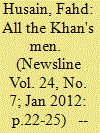

|
|
|
|
|
| Publication |
2012.
|
| Summary/Abstract |
Will Imran Khan succeed in juggling a bevy of heavy-weights who are diametrically opposed to him and to each other?
|
|
|
|
|
|
|
|
|
|
|
|
|
|
|
|
| 3 |
ID:
116295
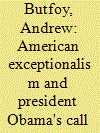

|
|
|
|
|
| Publication |
2012.
|
| Summary/Abstract |
President Obama came to office promising to make abolition of nuclear weapons a central policy goal. Conventional explanations for the arguably poor progress made here (explanations which focus on political and bureaucratic processes) fail to capture an important part of the story. This is that the president comes from a political tradition marked by exceptionalist assumptions. This tradition encompasses a distinctly American attempt to converge idealism and realism; it seeks change, but also constrains aspirations within conservative limits. His conception of exceptionalism is based on a presumption of American moral leadership integrated with a requirement for continued American strategic primacy. As a result, his view of abolition requires global acceptance of American conventional military superiority, reinforcing doubts about the vision's prospects.
|
|
|
|
|
|
|
|
|
|
|
|
|
|
|
|
| 4 |
ID:
078751
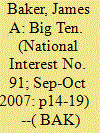

|
|
|
| 5 |
ID:
108187
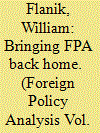

|
|
|
|
|
| Publication |
2011.
|
| Summary/Abstract |
This article borrows the concept of "metaphorical framing" from cognitive linguistics and uses it to engage cognitive foreign policy analysis (CFPA) with social constructivism. By accounting for the mutual constitution of agents and social structures (on one hand), and the interaction of somatic and social meaning (on the other), metaphorical framing narrows the gap between cognitive and constructivist approaches and enriches them both. Though it claims a "middle ground" between idealism and materialism, constructivism ignores how the shared meanings that constitute actors are embodied, that is, produced by the evolved human body-brain and its situatedness in the world. Metaphorical framing "fleshes out" constructivism, allowing it to theorize the causal micro-foundations of constitutive effects. On the other hand, CFPA brackets the social dimension of meaning. Metaphorical framing accounts for the shared meanings that constitute actors. It explains how these meanings are instantiated in the mind, and how they shape reasoning. Accounting for intersubjectivity in decisionmaking, then, helps CFPA avoid reductionism. While narrowing the gap between two research traditions, metaphorical framing also advances theories of discourse, persuasion, rhetoric, emotion, and decisionmaking. Ultimately, metaphorical framing facilitates theoretically integrative, methodologically pluralist research on the nature and role of meaning in foreign policy.
|
|
|
|
|
|
|
|
|
|
|
|
|
|
|
|
| 6 |
ID:
117119
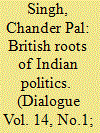

|
|
|
| 7 |
ID:
090676
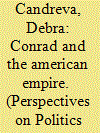

|
|
|
|
|
| Publication |
2009.
|
| Summary/Abstract |
Joseph Conrad offers some of the most notoriously contested writing on imperialism in nineteenth-century literature. In this article, I use two of his stories ("An Outpost of Progress" and Heart of Darkness) to argue that his critique of imperialism is as relevant today as it was in his own time.
Conrad's critique of imperialism is twofold. First and most simply, he condemns it as an economically exploitative endeavor. Second, and more importantly, he rejects the "idealistic" claim often invoked to justify imperialism as the bearer of progress, enlightenment, and other supposedly universal liberal values. This second critique causes Conrad the most difficulty, largely because his rejection of idealism is only partial. I argue that the most controversial aspects of his work are manifestations of a philosophical struggle between universalistic idealism on the one hand, and relativistic skepticism on the other. In this, Conrad contends with a problem that historically has challenged both liberalism and its conservative critics alike. Moreover, it continues to challenge both perspectives today, particularly in the debate over so-called American imperialism.
|
|
|
|
|
|
|
|
|
|
|
|
|
|
|
|
| 8 |
ID:
062411
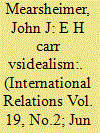

|
|
|
| 9 |
ID:
127308
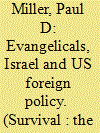

|
|
|
|
|
| Publication |
2014.
|
| Summary/Abstract |
America's Middle East policy has been a haphazard blend of hard-headed realism, idealism and dispensationalist theology. The result has not served US interests well.
|
|
|
|
|
|
|
|
|
|
|
|
|
|
|
|
| 10 |
ID:
153910
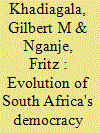

|
|
|
|
|
| Summary/Abstract |
South Africa is an emerging power with fairly strong democratic institutions that were crafted during the transition from minority to majority rule twenty years ago. How has South Africa used its position and power to promote democracy in Africa? Against the backdrop of debates on democracy promotion by emerging powers, this article probes attempts by successive post-apartheid governments to promote democracy in Africa. We argue that although democracy promotion featured prominently in South Africa's policy towards Africa in the immediate post-apartheid period under Nelson Mandela, the administrations of Thabo Mbeki and Jacob Zuma faltered in advancing democratic norms. This is largely because South Africa has confronted pressures to maximize pragmatic national interests, which have compromised a democratic ethos in a continental environment where these values have yet to find steady footing.
|
|
|
|
|
|
|
|
|
|
|
|
|
|
|
|
| 11 |
ID:
130823
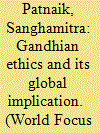

|
|
|
|
|
| Publication |
2014.
|
| Summary/Abstract |
Politics is the most crucial human activity that involves governance. Ethics is the set of principles those regulate the activity of governance and administration. Before we focus on Gandhian Ethics it is necessary to focus on the two schools of thought - Idealism and Realism. Idealism was an approach to international politics based upon liberal assumptions and principles. lt was optimistic as it envisioned a world.in which law, institutions and diplomacy replaced power, competition and use of force. This School was represented 'by St. Simon, Richard Cobden. Aldous Huxley, Russell, Mahatma Gandhi, Wilson and Margaret Mead. It gave emphasis on the role of education and international institutions to bring a better world. It focused on the Positive side of human nature. It proceeded with the assumption that the harmony of the interests was not impossible. Hans J. Morgenthau is the main exponent of realist theory. For him the central focus of realism was power. He de?ned power as "man's control over the minds and actions of other man"(Morgenthau,l993). He emphasized on: lnevitability of conflict among nations, Centrality of Power, Ever -present threat of war.
|
|
|
|
|
|
|
|
|
|
|
|
|
|
|
|
| 12 |
ID:
081163
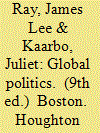

|
|
|
|
|
| Edition |
9th ed.
|
| Publication |
Boston, Houghton Mifflin Company, 2008.
|
| Description |
xix, 578p.Pbk
|
| Standard Number |
9780618783434
|
|
|
|
|
|
|
|
|
|
|
|
Copies: C:1/I:0,R:0,Q:0
Circulation
| Accession# | Call# | Current Location | Status | Policy | Location |
| 053275 | 909.82/RAY 053275 | Main | On Shelf | General | |
|
|
|
|
| 13 |
ID:
044754
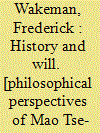

|
|
|
|
|
| Publication |
Berkeley, University of California Press, 1973.
|
| Description |
xvi, 392p.hbk
|
| Series |
Center for Chinese Studies
|
| Standard Number |
0520021045
|
|
|
|
|
|
|
|
|
|
|
|
Copies: C:1/I:0,R:0,Q:0
Circulation
| Accession# | Call# | Current Location | Status | Policy | Location |
| 011940 | 951.05/WAK 011940 | Main | On Shelf | General | |
|
|
|
|
| 14 |
ID:
186925
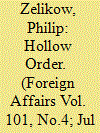

|
|
|
| 15 |
ID:
001938
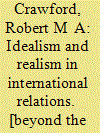

|
|
|
|
|
| Publication |
London, Routledge, 2000.
|
| Description |
xi,198p.
|
| Series |
Routledge advances in international relations and politics
|
| Standard Number |
0415154731
|
|
|
|
|
|
|
|
|
|
|
|
Copies: C:1/I:0,R:0,Q:0
Circulation
| Accession# | Call# | Current Location | Status | Policy | Location |
| 043117 | 327.101/CRA 043117 | Main | On Shelf | General | |
|
|
|
|
| 16 |
ID:
109483
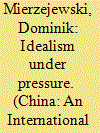

|
|
|
| 17 |
ID:
124407
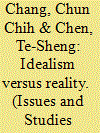

|
|
|
|
|
| Publication |
2013.
|
| Summary/Abstract |
Using data from the fifth wave 0/ the World Values Survey, this study analyzes the origins of postmaterialism and how it might affect people s support for environmental protection on the two sides of the Taiwan Strait. Our empirical results show that the level of postmaterialism in China is no less than it is in Taiwan. Age and education are two essential predictors for postmaterialism at the level of individual analysis. Middle class intellectuals in China are more concerned about postmaterialist issues than their counterparts in Taiwan. In addition, we .find that the Chinese demonstrate higher levels of support for environmental protection than the Taiwanese do, whereas Chinese postmaterialists are less likely to be concerned about the environment than Taiwanese postmaterialists. Therefore, we suggest a revised version of Inglehart's hypotheses to explain support for environmental protection. The paper underlines the effect of political institutions on shaping cultural values, in contrast previous studies that give too much weight to economic development
|
|
|
|
|
|
|
|
|
|
|
|
|
|
|
|
| 18 |
ID:
118923
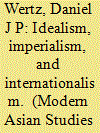

|
|
|
|
|
| Publication |
2013.
|
| Summary/Abstract |
While establishing a framework for colonial governance in the Philippines, American policymakers had to confront the issue of opium smoking, which was especially popular among the Philippine Chinese community. In 1903, the Philippine Commission proposed a return to the Spanish-era policy of controlling the opium trade through tax farming, igniting outrage among American Protestant missionaries in the Philippines and their supporters in the United States. Their actions revived a faltering global anti-opium movement, leading to a series of international agreements and domestic restrictions on opium and other drugs. Focusing mostly on American policy in the Philippines, this paper also examines the international ramifications of a changing drug control regime. It seeks to incorporate the debate over opium policy into broader narratives of imperial ideology, international cooperation, and local responses to colonial rule, demonstrating how a variety of actors shaped the new drug-control regimes both in the Philippines and internationally.
|
|
|
|
|
|
|
|
|
|
|
|
|
|
|
|
| 19 |
ID:
113884
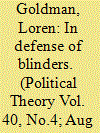

|
|
|
|
|
| Publication |
2012.
|
| Summary/Abstract |
Kant's progressive philosophy of history is an integral aspect of his critical system, yet it is often ignored or even treated as an embarrassment by contemporary scholars. In this article, I defend Kant and argue for the continuing relevance of his regulative assumption of historical progress. I suggest, furthermore, that the first-person stance of practical belief exemplified in Kant's conception of hope offers new resources for thinking about the relationship between the ideal and the real in political theory.
|
|
|
|
|
|
|
|
|
|
|
|
|
|
|
|
| 20 |
ID:
084882
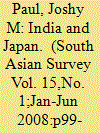

|
|
|
|
|
| Publication |
2008.
|
| Summary/Abstract |
The relationship between Japan and India has been influenced by the international power configuration over time. In the early post-War period, both countries embraced idealistic moor-ings about how the world should be. In due course of time, the United States (US) alliance system put Japan in the western camp of Cold War power politics while India followed a policy of non-alignment. However, with the end of the Cold War and the transformation of Asia into a composite power playground, India and Japan have developed a much closer relationship. The relative decline of America's strategic interest towards the East Asian region and the changing dynamics of security in Asia have forced Japan to search for new partners in Asia, culminat-ing in the present strategic partnership with India. It is in this context that this article probes Indo-Japanese relations by analysing their economic, political and strategic facets.
|
|
|
|
|
|
|
|
|
|
|
|
|
|
|
|
|
|
|
|
|